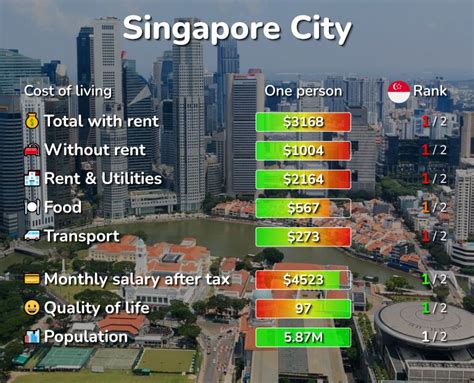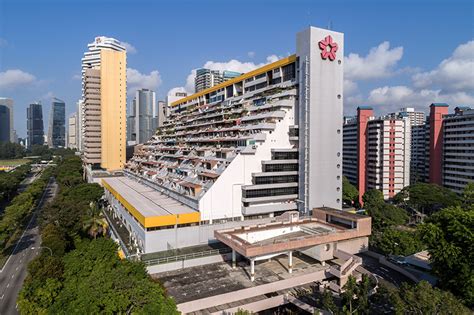

Rising Cost of Living in Singapore: VS 2025
Introduction
Singapore, known for its high standard of living, has witnessed a steady rise in the cost of living in recent years. This has become a major concern for residents, particularly those from lower-income households. The upward trend is projected to continue in the coming years, with experts predicting a further surge by 2025. Understanding the factors contributing to this increase is crucial for policymakers and consumers alike.

Factors Driving the Rising Cost of Living
1. Rising Housing Costs
Singapore’s housing market has been experiencing a sustained upward trajectory for decades, driven by limited land availability and strong demand. According to the Urban Redevelopment Authority (URA), the median price of a resale Housing and Development Board (HDB) flat reached a record high of S$520,000 in 2022, a 3% increase from the previous year. The cost of private property has also risen significantly, with the URA Residential Price Index increasing by 6.9% in Q1 2023. These soaring housing expenses have become a major burden for aspiring homeowners and tenants alike.
Impact:
- Higher housing payments, increasing the proportion of household income allocated to shelter.
- Reduced affordability for first-time homebuyers, potentially excluding them from the market.
- Increased rental costs, putting pressure on tenants’ budgets.
2. Inflationary Pressures
Singapore’s inflation rate has been on the rise in recent months, fueled by global economic factors such as supply chain disruptions, rising energy prices, and geopolitical conflicts. The Monetary Authority of Singapore (MAS) has estimated that the core inflation rate, which excludes the volatile components of food and energy, will average 4-5% in 2023, up from 2.1% in 2022. This means that the cost of goods and services is increasing at a faster pace, eroding the purchasing power of consumers.
Impact:
- Reduced purchasing power, as household budgets are stretched further.
- Increased living expenses, making it more challenging to meet basic needs.
- Potential impact on economic growth, as consumers cut back on discretionary spending.
3. Higher Healthcare Costs
Healthcare costs in Singapore are expected to rise significantly in the coming years due to an aging population, increasing prevalence of chronic diseases, and rising medical technology expenses. The Ministry of Health (MOH) has estimated that healthcare spending will grow by an average of 3-4% annually over the next decade. This will lead to higher healthcare premiums and out-of-pocket expenses for individuals and families.
Impact:
- Increased financial burden on households, particularly for those with elderly dependents.
- Potential access issues for those who cannot afford adequate healthcare coverage.
- Reduced disposable income, as a larger portion of budgets is allocated to healthcare.
4. Rising Transportation Costs
Transportation costs have been on an upward trajectory in Singapore, driven by increasing fuel prices and government policies aimed at reducing private vehicle ownership. The Land Transport Authority (LTA) has raised public transportation fares several times in recent years, and fuel prices have fluctuated significantly due to global supply and demand dynamics. These higher costs have made it more expensive for residents to commute and own vehicles.
Impact:
- Reduced mobility, as residents may opt for cheaper but less convenient transportation options.
- Increased financial burden, especially for those who rely heavily on private vehicles.
- Potential impact on economic productivity, as transportation costs affect business operations.
Impact on Households
The rising cost of living has had a significant impact on Singaporean households, particularly those from lower-income groups. Key areas of concern include:
- Reduced Disposable Income: The combination of rising expenses and stagnant wages has resulted in a reduction in disposable income for many households. This has left them with less money to spend on non-essential items and savings.
- Increased Financial Stress: The rising cost of living has placed a significant financial burden on households, leading to increased stress and anxiety. Those struggling to meet their expenses may resort to borrowing or taking on multiple jobs to make ends meet.
- Compromised Quality of Life: The rising cost of living has forced some households to compromise on their quality of life by reducing expenses on entertainment, travel, and healthcare. This can lead to reduced well-being and satisfaction.
Government Measures to Address the Rising Cost of Living
The Singaporean government has recognized the challenges posed by the rising cost of living and has implemented several measures to address the issue:
- Temporary Support Measures: The government has introduced temporary support measures such as the S$800 million Household Support Package in 2023, which provides financial assistance to households with lower incomes.
- Enhanced Social Safety Nets: The government has expanded social safety nets, such as the Workfare Income Supplement Scheme and Comcare assistance, to provide support to vulnerable families and individuals.
- Affordable Housing Schemes: The government has introduced affordable housing schemes, such as the Enhanced CPF Housing Grant Scheme and Proximity Housing Grant, to help first-time homebuyers purchase their homes.
- Wage Support Schemes: The government has implemented wage support schemes, such as the Progressive Wage Model and Workfare Income Supplement Scheme, to improve the wages of lower-income workers.
- Inflationary Control Measures: The MAS has implemented measures, such as monetary tightening, to control inflation and moderate price increases.
Tips and Tricks for Managing the Rising Cost of Living
Despite the government’s efforts, individuals and families can take steps to manage the rising cost of living and minimize its impact on their finances:
- Budgeting and Financial Planning: Create a detailed budget to track expenses and identify areas where you can cut back. This will help you allocate your resources more efficiently.
- Negotiate and Renegotiate: Contact your service providers to negotiate lower rates on utilities, internet, and insurance. Don’t hesitate to explore alternative or more affordable options.
- Consider Lifestyle Adjustments: Reduce expenses on non-essential items, such as dining out, entertainment, and travel. Explore free or low-cost activities to enjoy with family and friends.
- Maximize Income Sources: Explore ways to supplement your income through part-time work, freelancing, or passive income streams.
- Seek Financial Assistance: If you are struggling to make ends meet, do not hesitate to seek financial assistance from government programs, social welfare organizations, or financial institutions.
Reviews
-
“The rise in the cost of living in Singapore has been a major challenge, but the government’s support measures have provided some relief to lower-income households.” – Sarah, a resident of Singapore.
-
“Managing the rising cost of living requires a proactive approach, including budgeting, negotiating, and exploring alternative income sources.” – David, a financial advisor in Singapore.
-
“The government should continue to monitor the situation and implement additional measures if necessary to mitigate the impact of the rising cost of living.” – Peter, an economist in Singapore.
-
“It is important for individuals and families to stay informed about government assistance programs and explore innovative ways to manage their finances during this time.” – Amy, a social worker in Singapore.
Future Trends and How to Improve
The rising cost of living is expected to continue in the coming years due to factors such as population aging, urbanization, and technological advancements. To mitigate its impact and improve the lives of Singaporeans, the following steps are recommended:
- Encourage Innovation and Productivity: Invest in research and development to drive innovation and productivity growth, which can lead to higher wages and improved living standards.
- Strengthen Social Safety Nets: Expand and enhance social safety nets to










